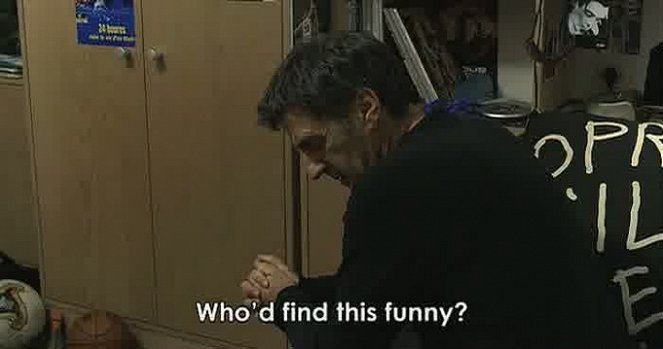Regie:
Michael HanekeDrehbuch:
Michael HanekeKamera:
Christian BergerBesetzung:
Daniel Auteuil, Juliette Binoche, Maurice Bénichou, Annie Girardot, Nathalie Richard, Walid Afkir, Bernard Le Coq, Daniel Duval, Aïssa Maïga (mehr)Streaming (4)
Inhalte(1)
Georges ist Moderator einer populären Literatursendung und Anne arbeitet für ein Verlagshaus. Das Ehepaar lebt mit seinem zwölfjährigen Sohn Pierrot in einem großen Stadthaus in einer ruhigen Straße. Nichts scheint dieses Idyll zu trüben, doch dann liegt eines Tages ein merkwürdiges Päckchen auf der Türschwelle der Laurents. Der Inhalt: Ansichten ihres Hauses, von der gegenüberliegenden Straßenseite gefilmt. Als sie ein zweites Videoband erreicht und Anne zudem von anonymen Anrufen terrorisiert wird, wendet sich Georges an die Polizei. Doch die bleibt bis zu einer vorgefallenen Straftat untätig und Georges macht sich selbst auf die Suche nach dem anonymen Stalker. Anne verliert die Geduld und vermutet einen Fan von Georges oder einen Streich von Pierrots Freunden. Postkarten mit der Kinderzeichnung eines toten Hahns erreichen Georges auf der Arbeit und Pierrot in der Schule.
Erste Vorsichtmaßnahmen werden getroffen und die Anspannung zwischen dem Ehepaar steigt. Mit den Bildern werden in Georges Erinnerungen wach, die er mit Anne nicht zu teilen vermag. Stattdessen fährt er zu seiner Mutter und erzählt ihr von seinem Traum, in dem der Waisenjunge Majid vorkommt. Majids Eltern waren Algerier und hatten für Georges‘ Eltern gearbeitet. Als sie 1961 bei Demonstrationen gegen den Algerienkrieg ums Leben kamen, beschlossen Georges‘ Eltern, Majid zu adoptieren. Doch Georges mochte ihn nicht und sorgte mit Lügengeschichten dafür, dass Majid ins Heim kam. Die Ereignisse hatte Georges schon längst verdrängt, doch nun holen ihn seine Schuldgefühle ein. Er wird mit einer tragischen Konsequenz konfrontiert.
(arte)
Kritiken (6)
Eine reine Filmemacher-Arbeit wie bei Kubrick, eine einzigartige Kombination aus theatralischen und filmischen Ausdrucksmitteln. Das kalte (langsame und leise) Komponieren der Szenen (fast ausschließlich nur Innenaufnahmen) ist eigentlich nicht mein Ding, den atemberaubenden Perfektionismus von Haneke kann man aber in jeder Minute des Films spüren. Und auf einmal stoppt er ihn brutal für ein paar Sekunden (diesen Schock kündigt er in der Szene mit dem Erzählen des "Witzes" am Tisch an). Ein anderer Film, den Sie sich merken werden – egal, was Sie von ihm denken. Die bisher umfangreichste und beste Rolle von Daniel Auteuil, in der ich ihn gesehen habe.
()
Excellent psychological drama, well acted and suspenseful, I hope not only for those who don't need to have everything presented in a semi-pathological way. I wouldn't say it's a challenging film, the plot is told in a clear way, without any confusing moments or dead spots, with one brutally surprising scene that makes your jaw drop. Even the author's comments on the complex racial issues of today's France can be felt in the film (the scene with the black man on his bicycle, the problem of Algerian immigrants). And the surprisingly open ending, with a long take on Majid's son's discussion with Pierrot, invites several interpretations, and while some may feel they have been deprived of something, I can’t complain. That understatement can so sexy sometimes. PS: I shed a nostalgic tear at the several-minute appearance of French film legend Annie Girardot.
()
Not for me. I don't think Michael Haneke is my thing. It's all too grounded and mundane for my taste, filmed entirely in an apartment, and the long static shots really pissed me off because I was always afraid that I had paused the film or someone cut it by mistake. It's very slow paced, unfortunately nothing really interesting happens for the whole two hours, no suspense at all, the twist is ambiguous and the vaunted "shocking" scene seemed rather comical to me. Lots of light psychological terror where I struggled not to fall asleep. It even made remember the horror of Anatomy of a Fall, which is similarly grounded and won the same European awards, so let the nerds enjoy it. 4/10.
()
I would divide the film's rating exactly in half. The form is traditionally refined by Haneke, and he managed to cast top-notch character actors who give their all. However, the content lags behind because Haneke's traditional style of leaving many things up to the viewer and ending as open-ended as possible turned into complete helplessness, and I wouldn't hesitate to use the word "awkward." The characters' motivations are unsatisfactory and the whole thing leaves me with the impression of "What did the poet actually want to say with this?" Overall impression: 50%.
()
I respect Haneke's distinctive vision as a filmmaker and admire his ability to put a bullet in a perceptive viewer's head with slow psychological pressure or, on the contrary, with a single suggestive moment (here I took two, maybe even three, thanks to one scene), but emotionally the director is unfortunately deaf... The minimalist camera work and sets and the actors themselves are traditionally flawless, and the visual clarity perfectly evokes a sense of psychological authenticity, allowing Haneke to skilfully mask the lacklustre story and leave it up to the viewer to wade through the deliberate understatement to their own mental interpretation. For me, however, Hidden didn't say much more than that its creator is a true master of intimate cinematic design and unique image-emotion harmony, but I’d known that for a long time. 70%
()
Interesting, academic?!, distinctive, and "cleanly" shot. Even if I wasn't left with the "right" unsettling feeling after watching it, as with other Haneke films, it's still a rather above-average work compared to the vast majority of other productions, and definitely won't leave you unmoved.
()

